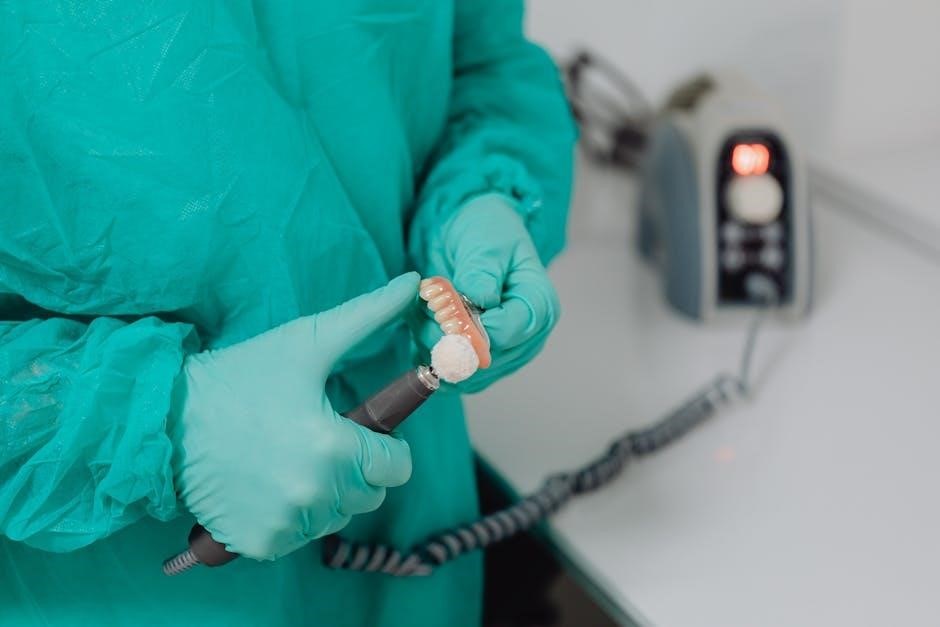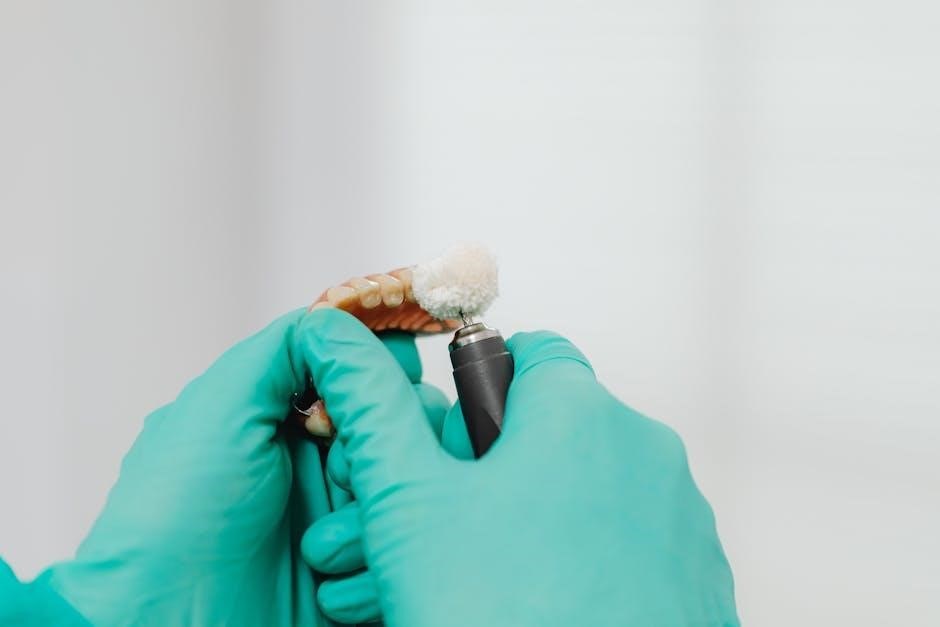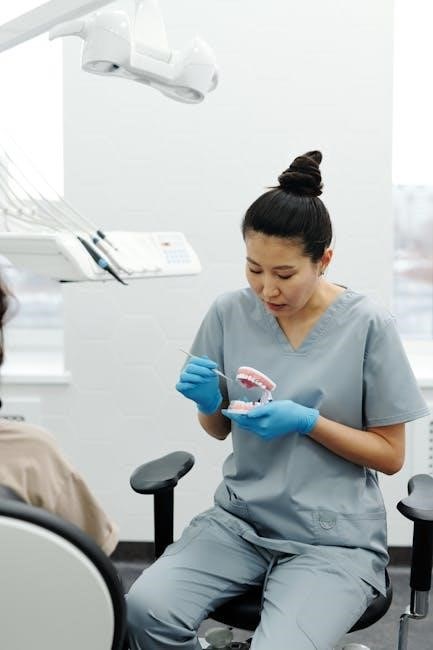
denture care instructions pdf
Proper denture care is essential for maintaining oral health and ensuring a comfortable‚ long-lasting fit. Regular cleaning and handling help prevent plaque buildup and extend denture longevity.
1.1 Importance of Proper Denture Maintenance
Proper denture maintenance is crucial for oral health and comfort. Regular cleaning prevents plaque buildup‚ which can lead to infections or bad odors. Clean dentures ensure a secure fit and proper chewing function. Neglecting maintenance can cause dentures to become discolored or warped‚ requiring costly repairs. Additionally‚ poor hygiene can lead to oral health issues‚ such as gum irritation or mouth sores. By following a consistent cleaning routine‚ you can extend the life of your dentures and maintain fresh breath and confidence. Proper care also supports overall mouth health‚ ensuring a comfortable and functional experience for years to come.
1.2 Overview of Denture Care Best Practices
Effective denture care involves a combination of daily cleaning‚ proper storage‚ and regular maintenance. Start by rinsing dentures after meals to remove loose food particles. Use a soft-bristled denture brush and mild soap to clean all surfaces‚ avoiding abrasive products like toothpaste. Soaking dentures overnight in a recommended solution helps loosen plaque and stains. Store them in water or a denture bath to prevent drying out. Avoid hot water and harsh chemicals‚ as they can damage the material. Regularly brushing gums‚ tongue‚ and palate promotes oral health. Following these practices ensures dentures remain clean‚ functional‚ and comfortable for years to come.

Daily Denture Cleaning Routine
Rinse dentures after meals and brush them twice daily with a soft-bristled brush and mild soap. This routine prevents plaque buildup and maintains hygiene.
2.1 Rinsing Dentures After Meals
Rinsing your dentures after every meal is a crucial step in maintaining their cleanliness. Use cold water to remove loose food particles and plaque‚ preventing buildup. This simple practice helps protect both your dentures and natural tissues from irritation and infection. Always rinse thoroughly before brushing or soaking to ensure effective cleaning. Regular rinsing also keeps dentures feeling fresh and comfortable throughout the day. Make it a habit to rinse immediately after meals to promote long-term oral health and denture longevity.
2.2 Brushing Dentures Twice a Day
Brushing your dentures twice daily is vital for removing plaque‚ bacteria‚ and food particles. Use a soft-bristled denture brush and a mild cleanser or soap to gently scrub all surfaces. Avoid toothpaste‚ as it can be abrasive and damage the denture material. Brushing helps maintain the appearance and functionality of your dentures while preventing bad odors and infections. Pay special attention to areas where the denture meets your gums to ensure a clean fit. Regular brushing also promotes oral hygiene and keeps your dentures comfortable for daily use. Always clean over a basin or towel to avoid accidental damage if dropped.
2.3 Using a Denture Brush and Mild Soap
A soft-bristled denture brush is ideal for cleaning dentures‚ as it effectively removes plaque without damaging the material. Apply a small amount of mild soap or denture paste to the brush‚ avoiding abrasive toothpaste. Gently scrub all surfaces‚ including the areas where the denture meets your gums. Rinse thoroughly with cold water to remove soap residue. This method ensures a thorough clean without causing wear or discoloration. Regular use of a denture brush and mild soap helps maintain the appearance and functionality of your dentures while preventing bacterial buildup and bad odors.

Cleaning Products and Solutions
Use mild soap and denture-specific cleaners to avoid damaging materials. Avoid abrasive products and harsh chemicals‚ as they can scratch or discolor dentures. Soaking solutions can help remove plaque and stains effectively when used as directed.
3.1 Denture Cleaning Solutions: How to Choose
Selecting the right cleaning solution for your dentures is crucial. Look for products specifically designed for dentures to avoid damage. Mild soap and water are effective for daily cleaning. Avoid harsh chemicals‚ abrasive cleaners‚ or regular toothpaste‚ as they can scratch or discolor the denture material. Always follow the manufacturer’s instructions for soaking solutions to ensure proper cleaning and safety. Proper cleaning helps maintain hygiene and prevents the buildup of plaque and stains‚ ensuring a fresh and comfortable fit.
3.2 Soaking Dentures Overnight
Soaking dentures overnight is a key step in maintaining their cleanliness and fit. Use a denture cleaning solution as directed by the manufacturer to help remove plaque and stains. Avoid soaking in hot water‚ as it can warp the denture material. Instead‚ opt for cold water or a specialized soak. This process ensures dentures remain moist‚ preventing them from drying out and becoming brittle. Regular overnight soaking also helps maintain oral hygiene and keeps dentures fresh. Always rinse thoroughly before reinserting to remove any residual solution.
3.3 Avoiding Abrasive Cleaners and Toothpaste
Avoid using abrasive cleaners or regular toothpaste on dentures‚ as they can scratch the surface or cause discoloration. Toothpaste is designed for natural teeth‚ not denture materials‚ and may contain harsh ingredients. Instead‚ opt for a soft-bristled brush and mild liquid soap or a non-abrasive denture cleanser. Harsh chemicals and abrasive products can weaken the denture structure over time. Always check the product label to ensure it is safe for dentures. This gentle approach helps maintain the denture’s appearance and prevents damage‚ ensuring they remain comfortable and functional for years.

Caring for Your Mouth
Even with dentures‚ maintaining oral hygiene is crucial. Brush your gums‚ tongue‚ and palate daily to prevent irritation and infections‚ ensuring a healthy foundation for your dentures.
4.1 Brushing Gums‚ Tongue‚ and Palate
Brushing your gums‚ tongue‚ and palate is vital for maintaining oral hygiene‚ even with dentures. Use a soft-bristled toothbrush and mild soap or toothpaste to gently remove bacteria and debris. This helps prevent irritation‚ bad breath‚ and infections. Pay special attention to areas where the dentures rest to ensure a healthy foundation. Regular brushing also stimulates blood flow‚ keeping tissues strong and promoting a comfortable fit for your dentures. Clean these areas daily‚ preferably before inserting your dentures‚ to maintain overall mouth health and ensure a fresh‚ clean feeling.
4.2 Maintaining Oral Hygiene with Dentures
Maintaining oral hygiene with dentures involves more than just cleaning the dentures themselves. Daily cleaning of gums‚ tongue‚ and palate with a soft brush removes plaque and bacteria‚ preventing infections. Regular rinsing after meals helps eliminate food particles that could cause irritation. Avoiding abrasive cleaners ensures the health of surrounding tissues. Proper denture care also includes storing them in water or a denture bath to prevent drying out‚ which can distort their shape. By following these practices‚ you ensure a healthy‚ comfortable fit and overall oral well-being‚ making denture wear a seamless part of your daily routine.

Storage and Maintenance
Store dentures in water or a denture bath to prevent drying out and distortion. Avoid harsh chemicals and hot water‚ as they can damage the material.
5.1 Storing Dentures in Water or a Denture Bath
Storing dentures in water or a denture bath prevents drying out and distortion. Use cold water or a solution recommended by your dentist to maintain shape and hygiene. Always soak dentures in a covered container or denture bath to avoid contamination. Change the water daily to prevent bacterial growth. Avoid hot water‚ as it can warp the denture. If using a denture bath‚ ensure it is clean and free from harsh chemicals. Proper storage keeps dentures moist and ready for use‚ ensuring a proper fit and comfort.
5.2 Avoiding Hot Water and Harsh Chemicals
Avoid exposing dentures to hot water‚ as it can cause warping or distortion. Harsh chemicals‚ such as bleach or abrasive cleaners‚ can damage the material or discolor the dentures. Only use mild soap and cold water for cleaning to prevent harm. Avoid soaking dentures in dishwashers or using boiling water‚ as these can also cause irreversible damage. Instead‚ opt for gentle cleaning products and room-temperature water to maintain the integrity and appearance of your dentures. This ensures they remain comfortable and functional for years to come.
5.3 Preventing Denture Warping or Distortion
To prevent denture warping or distortion‚ avoid exposing them to extreme temperatures‚ such as hot water‚ which can alter their shape. Always soak dentures in a denture bath with cool or room-temperature water. Handle dentures with care to avoid bending or dropping them‚ as this can cause structural damage. Store dentures in a protective case when not in use to prevent accidental warping. Regular dental check-ups can also help ensure a proper fit‚ reducing the risk of distortion over time. By following these steps‚ you can maintain the integrity and longevity of your dentures.

Common Mistakes to Avoid
Common mistakes include not cleaning dentures regularly‚ using abrasive cleaners‚ and mishandling them‚ which can lead to damage and poor fit.
6.1 Not Cleaning Dentures Regularly
Failure to clean dentures daily can lead to plaque buildup‚ causing bad breath and discomfort. Neglecting this step also promotes bacterial growth‚ which can harm overall oral health.

6.2 Using Inappropriate Cleaning Products
Using abrasive cleaners or regular toothpaste can scratch denture surfaces‚ leading to damage. Always opt for mild‚ non-abrasive products to maintain denture integrity and prevent unnecessary wear and tear over time.
6.3 Dropping or Mishandling Dentures
Dropping or mishandling dentures can cause cracks‚ breaks‚ or misalignment‚ leading to discomfort and costly repairs. Always clean over a basin or towel to cushion falls. Handle dentures gently‚ ensuring a secure grip‚ especially when wet. Avoid bending or forcing parts‚ as this can warp the structure. Regular inspections for damage are crucial to prevent further issues. Neglecting proper handling can result in premature wear and the need for professional adjustments or replacements‚ emphasizing the importance of careful daily care to maintain functionality and longevity.


Professional Care and Check-Ups
Regular dental visits ensure proper fit‚ address issues‚ and maintain overall oral health‚ while professional cleanings and adjustments help extend denture lifespan and functionality effectively.
7.1 Importance of Regular Dental Visits
Regular dental visits are crucial for maintaining denture health and overall oral well-being. Dentists inspect dentures for fit‚ wear‚ and damage‚ ensuring they function properly and comfortably. These check-ups help prevent issues like sores‚ infections‚ and misalignment. Even with proper home care‚ professional evaluations are necessary to address concerns early. Dentists can also clean areas beneath dentures‚ promoting gum health. Regular visits ensure long-term satisfaction and prevent complications‚ making them an essential part of denture care routines.
7.2 Adjustments and Repairs: When to See a Dentist
Regular dental visits are crucial for maintaining denture health and overall oral well-being. Dentists inspect dentures for fit‚ wear‚ and damage‚ ensuring they function properly and comfortably. These check-ups help prevent issues like sores‚ infections‚ and misalignment. Even with proper home care‚ professional evaluations are necessary to address concerns early. Dentists can also clean areas beneath dentures‚ promoting gum health. Regular visits ensure long-term satisfaction and prevent complications‚ making them an essential part of denture care routines.

Additional Tips for Denture Wearers
Eat soft foods initially‚ chew slowly‚ and avoid biting hard objects. Clean dentures over a basin or towel to prevent dropping. Store them safely overnight.
8.1 Eating and Chewing with Dentures
Start with soft foods like yogurt or mashed vegetables during the adjustment period. Chew slowly and evenly‚ using both sides of your mouth. Avoid biting hard objects directly‚ as this can damage dentures. Remove dentures for foods like nuts or seeds to prevent damage. After meals‚ rinse or clean your dentures to remove food particles. Over time‚ you can gradually introduce a variety of foods‚ ensuring proper chewing techniques to maintain comfort and functionality. Proper eating habits help extend the life of your dentures and promote overall oral health.
8.2 Removing Dentures at Night
Removing dentures at night is crucial for allowing your gums and mouth tissues to rest and recover. This practice helps prevent irritation and ensures proper oral health. Always clean your dentures before storage‚ then soak them in water or a denture cleaning solution to maintain their shape and prevent drying out. Storing them in a safe place‚ such as a denture bath‚ protects them from accidental damage. Regular overnight removal also promotes healthy gum healing and reduces the risk of infections. Make this a consistent habit for optimal denture comfort and longevity.
8.3 Cleaning Dentures Over a Basin or Towel
Cleaning dentures over a basin or towel is a practical approach to prevent accidental damage. Place a towel in the basin to cushion the dentures if dropped. Use a soft-bristled brush and mild soap to gently remove plaque and debris. Rinse thoroughly under cold water to ensure all residue is removed. This method helps maintain cleanliness and prevents water splashing. Regularly cleaning over a basin or towel supports effective denture maintenance and promotes overall oral health.
Proper denture care ensures comfort‚ hygiene‚ and longevity. Regular cleaning‚ storage‚ and professional check-ups are vital for maintaining healthy dentures and supporting overall oral health effectively.
9.1 Summary of Key Denture Care Practices
Consistent care ensures denture longevity and oral health. Rinse dentures after meals‚ brush daily with a soft brush and mild soap‚ and soak overnight. Avoid abrasive cleaners and toothpaste. Store dentures in water or a denture bath to prevent warping. Clean gums‚ tongue‚ and palate daily to maintain hygiene. Regular dental visits are crucial for adjustments and professional cleaning. Handle dentures carefully to avoid damage‚ and remove them at night for proper maintenance. These practices promote comfort‚ functionality‚ and overall well-being for denture wearers.
9.2 Encouraging Long-Term Denture Health
Committing to proper denture care fosters long-term oral health and comfort. Regular cleaning‚ soaking‚ and storage in water prevent plaque buildup and distortion. Avoiding harsh chemicals and abrasive products protects the denture material. Daily brushing of gums‚ tongue‚ and palate maintains tissue health. Scheduling routine dental check-ups ensures proper fit and functionality. By adhering to these practices‚ denture wearers can enjoy a healthy‚ confident smile for years. Consistency in care not only extends denture lifespan but also supports overall well-being.